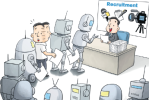1 . 
News anchors(主播) must have been reluctant to read out the following news: Xin Xiaomeng began working as the world’s first female artificial(人工的) intelligence news anchor at Xinhua News Agency on Sunday, three months after a male robot joined the profession.
Unlike previous news robots though, Xin does not read news like a cold machine; she reads it almost like a human being. The muscles on her face stretch and relax-and her reactions change-as she continues reading. That’s why many news anchors were worried: Will AI replace us in the near future?
To find the answer, we have to analyse the technologies that support Xin at her job. Three key technologies are used to support Xin. First, samples of human voices are collected and synthesized (合成). This is followed by the collection and synthesis of human muscle movement samples. And third the voices and movements are married in a way that when the Al news anchor reads, the micro -electric motors behind her face move to make her expressions seem more human.
Yet we need a thorough knowledge of deep leaning technology to make a robot imitate a person’s voice. The developer needs to collect tens of thousands of pieces of pronunciations, input them Into the machine and match them with the text or the Al to lean and read. The process for imitating facial movements is similar. The developer has to analyse the movements of the 53 muscles in the human face, make a model set from the collected data for the AI news anchor to lean, and imitate the movements of facial muscles via programs
Both the technologies used to make Xin’s performance impressive are mature. The real difficulty lies in the third -the technology to match the pronunciations with facial movements so that Xin expressions vary according to the content of the news report. In fact, Xins expressions don' t always change according to the content. As a result, her expressions look anything but human. Actually. AI is still no match for human qualities.
1. What does the underlined word "reluctant "in the first paragraph mean?| A.Delighted. | B.Unwilling. | C.Confused. | D.Optimistic. |
| A.They read news without expressions. | B.They looked like a human being |
| C.They could interview sports stars | D.They could interact with audience. |
| A.This technology is very perfect so far |
| B.This technology is quite popular now |
| C.This technology remains at the theoretical stage |
| D.This technology is far from mature. |
| A.human news anchors should learn from AT anchors to save their jobs |
| B.Al anchors perform much better than human news anchors at present |
| C.Al news anchors won 't replace human news anchors in the near future |
| D.Xin Xiaomeng s expressions vary so naturally that they are true to life |
2 . When people see machines that respond like humans, or computers that perform amazing feats of strategy, they sometimes joke about a future in which humanity will need to accept robot overlords. But buried in the joke is a seed of unease. Science fiction writing and popular movies have shown us about artificial intelligence (AI) that exceeds the expectations of its creators and escapes their control, eventually outcompeting and enslaving humans or targeting them for extinction(灭绝).
Even in the real word, not everyone is ready to welcome AI with open arms. In recent years, as computer scientists have pushed the boundaries of what AI can accomplish, leading figures in technology and science have warmed about the frightening dangers that artificial intelligence may pose to humanity, even suggesting that AI capabilities could destroy the human race.
But why are people so frightened about the idea of AI?
Elon Musk is one of the famous voices that have raised red flags about AI, In July 2017. Musk told attendees at a meeting of the National Governors Association, I have exposured to the very cutting-edge Al,and I think people should be really concerned about it.I keep sounding the alarm bell. But until people see robots going down the street killing people, they don't know how to react, because it seems so impossible."
Earlier, in 2014, Musk had labeled AI "our biggest existential threat," and in August 2017, he declared that humanity faced a greater risk from AI than the terrorists. Physicist Stephen Hawking, who died on March14, also expressed concerns about AI, telling the BBC in 2014 that "the development of full artificial intelligence could spell the end of the human race.
1. What are top scientists in AI worried about?| A.Its ability of impressive fests. | B.It contributes too much to movies. |
| C.It may end the human race some day. | D.It's capability to bury our seeds in jokes. |
| A.Questions. | B.Warnings |
| C.Complaints. | D.Wonders. |
| A.be a great threat to human beings. | B.learn the human emotions like fear. |
| C.predict the future of the human race. | D.compose horrible tales into scary stories. |
| A.Technology | B.Health |
| C.Planet earth. | D.Human nature. |



